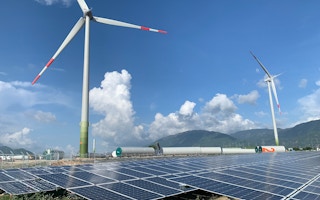A multi-billion dollar climate deal to help Vietnam shift from coal to clean energy should be put on hold until the government stops a crackdown on environmentalists that threatens efforts to support communities hit by the transition, activists said.
Late last year, G7 nations - together with Norway, Denmark and the European Union - agreed to provide US$15.5 billion to help Vietnam ditch climate-heating coal, similar to other pacts with South Africa, Indonesia and Senegal that offer emerging economies financing to reduce greenhouse gas emissions.
Vietnam’s “just energy transition partnership” (JETP) stressed the importance of regular consultations with media, civil society and NGOs.
But last month Hanoi police detained Ngo Thi To Nhien, executive director of the Vietnam Initiative for Energy Transition, an independent think-tank focused on green energy policy, for “appropriating documents” regarding the state-owned electricity utility, according to media reports.
“The detention of Nhien should give (donors) serious pause in proceeding with a deal under these conditions,” Maureen Harris, a senior advisor at US-based nonprofit International Rivers, told Context.
“Before proceeding further, financial backers and other stakeholders … should ensure a strong rights-based safeguard policy - specific to JETPs - that includes clear provisions against reprisals and for protection of environmental defenders,” she added.
‘Social consensus’ needs consultation
Nhien is the sixth Vietnamese environmentalist working in energy to be detained since mid-2021, said Harris, adding that provisions in JETPs to protect green groups are now urgently needed for any kind of “just” transition to be achieved.
Last month, Hoang Thi Minh Hong, director of an environmental advocacy group, was sentenced to three years in prison, while well-known environmental advocate Nguy Thi Khanh was jailed for two years in 2022 - both among a number of Vietnamese environmentalists imprisoned for tax-related charges.
After US President Joe Biden visited Hanoi last month, an official said Washington regularly calls on Vietnam to respect and protect human rights.
“
The Vietnam government needs to wake up and smell the coffee that their paranoia about the environmental movement is totally unjustified, and that these activists are working for the good of the country, not to bring down the Communist Party of Vietnam.
Robertson, deputy Asia director, Human Rights Watch
A spokesperson for the European Union declined to comment on the detentions and the JETP, but cited a statement released earlier this month by the EU’s diplomatic service raising concerns over the sentencing of Hong.
It urged Vietnam “to ensure its actions are consistent with its international commitments, including to consult with non-government stakeholders as part of the Just Energy Transition Partnership”, noting the JETP’s joint launch declaration stated consultation was needed “to ensure a broad social consensus”.
Britain’s foreign ministry pointed to a statement earlier this month on the sentencing of Hong, which noted Vietnam’s commitment to consult on the JETP and urged authorities to ensure civil society organisations can operate and participate without “fear of unfair treatment, targeting or prosecution”.
The foreign ministries of Vietnam, Norway, Denmark and the United States did not immediately respond to requests for comment.
Nhien’s detention shows the crackdown on environmentalists is expanding and now targeting technical experts, said Phil Robertson, deputy Asia director at Human Rights Watch.
Nhien was working with major international agencies like the UN Development Programme and the World Bank to craft plans to tackle climate change, he added.
The JETP for Vietnam should not go forward while these activists are in pre-trial detention or prison, said Robertson, urging financial backers to redouble public and private advocacy for their immediate and unconditional release.
“The Vietnam government needs to wake up and smell the coffee that their paranoia about the environmental movement is totally unjustified, and that these activists are working for the good of the country, not to bring down the Communist Party of Vietnam,” he added.
Jailing of environmentalists in two-year trend
In the next five years, it is hoped that the JETP will provide finance - half from donor governments and half from commercial banks - to ramp up Vietnam’s transition away from coal towards clean energy like solar and wind, and create jobs.
Currently one of the world’s top 20 coal users, the Southeast Asian country’s energy deal will see its emissions peak by 2030 rather than an earlier target of 2035, by limiting coal power capacity and sourcing almost half of its electricity from renewables within this decade.
One Southeast Asia climate advocate, who spoke on condition of anonymity for fear of repercussions, said the detention of Nhien was “disappointing, disturbing, disheartening and depressing”, continuing a trend that began about two years ago.
“The prior arrests already had a chilling effect on civil society organisations in Vietnam and have effectively created a climate of fear among them,” said the advocate.
While donor countries had expressed concern over the jailing of environmentalists, it was not considered a red line to prevent the project going ahead, he added.
When Vietnamese environmentalists face legal challenges, it limits their ability to contribute to the JETP’s success and broader sustainability efforts, said UK-based Namrata Chowdhary, chief of public engagement at climate activist group 350.org.
Moreover, the ripple effects on the wider environmental movement could discourage others from engaging in activism or advocacy in Vietnam, hindering progress on global sustainability goals, such as clean and affordable energy, she said.
The timing of the latest round of environmentalist detentions, including Nhien, “is suggestive of an unfortunate trend aimed at deterring civil society’s participation in processes that impact them the most”, she added.
This story was published with permission from Thomson Reuters Foundation, the charitable arm of Thomson Reuters, that covers humanitarian news, climate change, resilience, women’s rights, trafficking and property rights. Visit https://www.context.news/.










